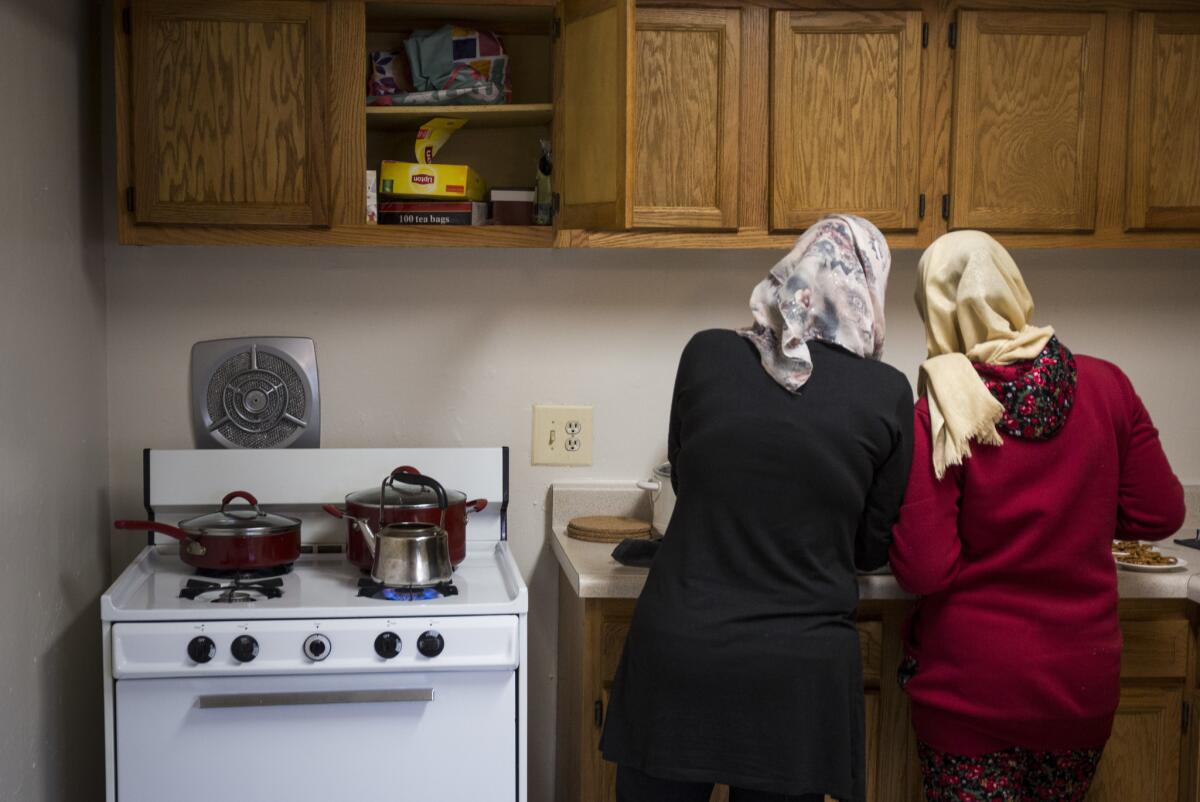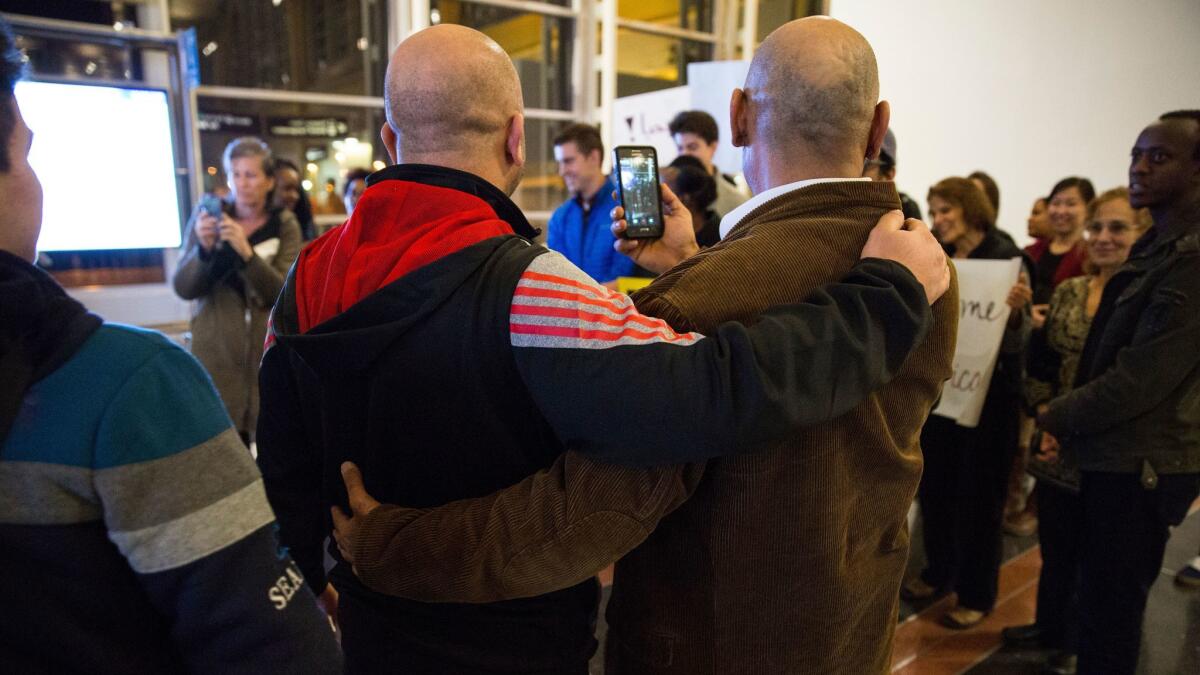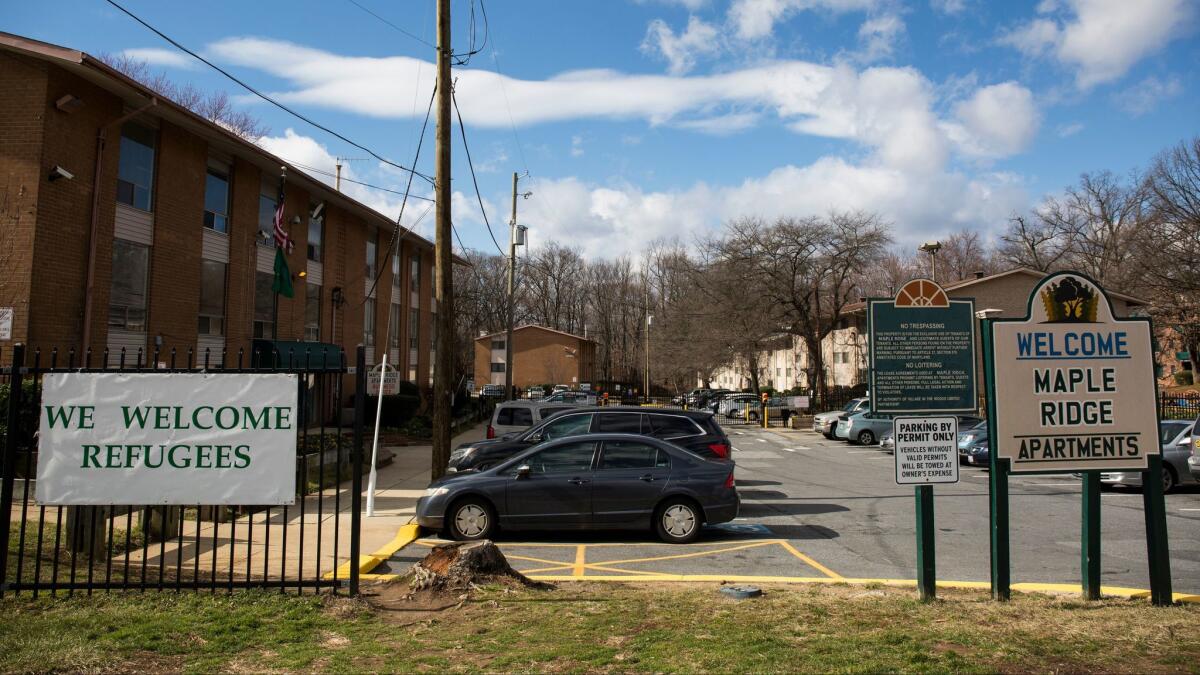An interrupted journey ends in a new life in the U.S. for Syrian refugee family

Dense desert fog enveloped Queen Alia International Airport outside Amman, Jordan. Zohri A., a Syrian mechanic who was about to fly to the United States with his wife and four children for refugee resettlement, waited nervously to learn whether their flight to Chicago would take off as scheduled.
Soon enough, word came down: The flight was canceled due to the bad weather. Zohri and his family took the news calmly, even though they had already sold their scant possessions, vacated their small apartment and dressed in their best for the momentous voyage. They’d be booked on another flight in coming days, they were assured.
Local representatives of the United Nations’ International Organization for Migration, which deals with logistics for departing refugees, quickly arranged for hotel accommodations for the family near the Amman airport. The children, especially the littlest, 5-year-old Amr, were drooping with fatigue. Zohri and his wife, Samar, went online to let friends and family know they wouldn’t be starting their new lives in the United States just yet.
It was a setback, but not a grave one. They’d survived war’s bloody ruination of their Syrian hometown, Homs, endured years of hardscrabble life in Jordan and undergone an exhaustive U.S. vetting process that had lasted more than two years. They were confident they would overcome this last small obstacle.
On the other side of the globe, at the Silver Spring, Md., office of the International Rescue Committee, news of the flight’s weather cancellation was updated in a multiagency database that keeps track of refugee arrivals. The family, destined for settlement in a Maryland suburb of Washington, D.C., would not be arriving that evening after all.
Such routine delays were disappointing, but didn’t unduly alarm the office’s deputy director, Preethi Nampoothiri, a veteran of hot-zone humanitarian work in Africa and the Middle East. Last-minute glitches happened for a variety of reasons. In any event, traffic that day would be tricky in and around the nation’s capital anyway.
After all, it was Inauguration Day: Jan. 20, 2017. Donald J. Trump was being sworn in as the American president.
::
One week later, seated at an ornate table and flanked by aides, Trump applied his signature to an executive order, one of his first as president.
Under the order, the U.S. refugee resettlement program was suspended for 120 days, and Syrian refugees were to be excluded indefinitely. Travelers from seven Muslim-majority countries, including Syria, were banned from entry for three months. Tens of thousands of visas were invalidated; within hours, airports across the U.S. and around the world would be thrown into chaos, with hundreds of passengers denied boarding or detained on arrival.
Nampoothiri immediately recognized the implications for her organization’s work — and for families like these soon-expected Syrians. “Devastating,” she recalled. “A real feeling of sadness.”
The signing was at 4:42 p.m. in Washington, nearly midnight in Jordan, but among the Syrian refugee community, the news raced across messaging apps and social-media platforms. Zohri learned of it by scrolling through his Facebook feed, and he and Samar spent an anxious night.
In the morning, their worst fears were confirmed. They would not be allowed to board their scheduled flight.
“We were speechless,” Samar said later. “We thought, ‘This dream is over.’”
::
War came early to the western Syrian city of Homs, the cradle of the uprising against President Bashar Assad that began in 2011. Rebels had established a stronghold in the city, about 100 miles north of Damascus. And the army arrived to root them out, whatever the cost to civilians.
By March 2012, the situation was dire. Then-U.N. Secretary-General Ban Ki-moon told the General Assembly that month that he had received “grisly” reports of arbitrary killings and torture by government forces in the city.
Before the war, the city was a thriving industrial center with a population of more than 650,000. Zohri worked in specialty truck repair, a good job with management responsibilities and a solid middle-class income. Samar cared for their children. The two oldest were then in elementary school and doing well in classes, especially Noor, who loved to read.
“We had a beautiful home,” Samar said, remembering. “A beautiful life,” Zohri chimed in.
::
Escaping the fighting in Homs, Zohri’s family had first sought shelter outside Damascus, then made their way to Lebanon.
In 2013, they enlisted a smuggler’s help to get to Jordan, and settled in the dusty village of Mutah. A friend of Zohri’s from home, Husni, helped him find work in a clothing shop, but because he could not work legally, he accepted pay that was barely enough to live on. Samar worked also, at a bus company — also for almost no money. The children could not enroll permanently in school. Their apartment was small and its surroundings squalid; they dared not complain.
“We could see there was no future for us in that place,” said Samar.
Early in their stay in Jordan, they registered as refugees with the U.N. Eventually, after a series of interviews, the United Nations High Commissioner for Refugees, UNHCR, referred them for resettlement in the United States. That inaugurated a two-year round of U.S.-mandated vetting: biometric checks, extensive background inquiries, repeated rounds of questioning about Zohri’s political leanings and the family’s reasons for fleeing Syria.
When their departure hopes were dashed by the executive order, Samar and Zohri and the children left Amman and traveled back to Mutah, finding themselves back in the same shabby little apartment they thought they had left behind forever.
They bought back some of the furniture they had sold days earlier for so little, paying a premium price. The smaller children, sensing their parents’ distress, were quiet.
Noor, the eldest, about to turn 14, was the only one who cried. “How will I go to school now?” she asked. “How will I get an education?”
At some point in their stay in Mutah, someone had sent Zohri a photo of the family house in Homs, now a pile of rubble. He didn’t want to look at it. It wasn’t home any more.
::
In the United States, legal challenges to the travel ban mounted daily across the country. One landed in the Seattle courtroom of U.S. District Judge James Robart. On Feb. 3, a Friday, he placed a nationwide stay on the executive order.
Two days later, Zohri and Samar received a call with the electrifying news: Get ready. You leave tomorrow.
Hastily repacking, the family rushed back to Amman for Monday’s late-morning flight to Chicago, crowded with a big contingent of Syrians with similar hopes.

When the plane touched down at O’Hare International Airport, applause broke out in the cabin. Entry formalities went smoothly. While the family waited to change planes for their flight to Washington, a woman came up to Samar and hugged her. As someone from a modest society, the Syrian woman was startled by such a seemingly forward gesture from a stranger — but recounting it later, her delicate features bloomed.
“I began to realize we were home,” she said.
::
In Silver Spring, the IRC office got word of the family’s impending arrival the same day that Zohri and Samar had. They had a little over 24 hours to get ready.
Logistics specialist Corey Rheingrover put in a call to the manager of an apartment complex in Landover, Md., where at least half a dozen other Syrian families had been placed. After all the stop-and-go of the past two weeks, was there an apartment suitable for a family of six? It turned out there was, but it was completely empty, with no furniture or household essentials.

Rheingrover put in his next call to a charity called Mozaic, based in Sterling, Va. On the other end of the phone was a 47-year-old dynamo named Raghad Bushnaq, who had emigrated from Syria in 1989.
She swiftly lined up donated furnishings, renting U-Haul trailers and dashing to three separate locations to assemble what was needed — beds, a dining set with chairs, a sofa.
Husni, the family’s old friend from Homs and Mutah, who had managed to leave six months earlier, lived in the same complex. He quickly rounded up neighbors to help assemble furniture and unpack pantry items, toiletries, bedding.
At one point, some 18 people were bustling around the apartment, making beds, folding towels, putting groceries in cabinets, toothpaste in the bathroom. The aromas of traditional offerings like mahshi, an eggplant dish, brought by Syrian neighbors wafted through the air.
“It was really something magical,” Bushnaq said of the communal effort. It brought back memories of her own arrival in the United States, when she knew no one except her husband, she said.
“It was a joyous time for me, coming here as a bride,” said Bushnaq. “But these people, they are coming because they have lost everything.”
::
It was a minute after midnight when the family emerged from the connecting corridor at Reagan Washington National Airport. Despite the hour, about two dozen well-wishers had gathered, waving welcoming signs. “Ahlan” (“Welcome”) read one in Arabic script emblazoned with glitter.
Husni rushed forward to embrace Zohri. Someone handed Samar a bouquet. Little Amr half-hid behind his 13-year-old brother, Mohammad. Ten-year-old Aya, with pink clasps holding her high braids in place, blinked in surprise when she was given a box of chocolates, then smiled shyly.
Nampoothiri watched for a few moments before she stepped forward to gently usher the family toward baggage claim. “This is the best part of the job,” she said quietly.
::
Three days later, the family had begun to settle in at their Landover apartment. Like many refugees, they did not want their full names used, still fearing for the safety of relatives back in Syria, but they offered tea to visitors and insisted, just as they would at home, that it be accepted.
They’d seen the Washington Monument from the plane, they said. Zohri had awakened the kids on the drive in to point out the apartment complex’s swimming pool.
Much work lay ahead. They would need Social Security numbers, health-insurance enrollment. Husni was going to teach them the bus routes. Tests for placement in an English program. A cultural-orientation class was starting next week at the resettlement agency.
The children were already on a school-registration list and needed to get their vaccinations. Mohammad, smoothing a pompadour, wondered if he could sign up for the track team and compete in the shot put, his favorite event.
Khalid Balajem, a caseworker who brought them home the first night, described the family gawking at the apartment’s furnishings, which included a car-shaped bed for Amr. The children asked him again and again: Is this really all for us?
Arrivals of other refugees would continue, for now. But with the Trump administration planning to cap all refugee arrivals at 50,000 this fiscal year, only about 16,000 more will be allowed in through October.
The UNHCR in Jordan has already turned its attention to other countries for resettlements, countries where there’s more of a chance of success.
Zohri’s family counted themselves among the lucky ones.
More to Read
Start your day right
Sign up for Essential California for news, features and recommendations from the L.A. Times and beyond in your inbox six days a week.
You may occasionally receive promotional content from the Los Angeles Times.






